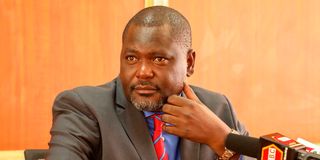Ruku should go beyond loyalty, chart own path

Mbeere North MP Geoffrey Ruku.
MP Geoffrey Kiringa Ruku has emerged as a notable figure in Kenya’s political landscape, balancing development-focused governance, environmental advocacy and political loyalty. As the elected MP for Mbeere North, and now a Public Service Cabinet Secretary nominee, Mr Ruku stands at a pivotal moment in his career.
His ascent has been marked by resilience, from multiple unsuccessful election bids to securing a parliamentary seat in 2022 under the Democratic Party. Beyond politics, his work in environmental sustainability, particularly in community-based carbon offset programmes, sets him apart.
The Mbeere have historically been marginalised in national politics and have had to carve out influence through economic resourcefulness and strategic alliances. The electorate in this region values tangible development over political rhetoric. This pragmatic outlook explains Mr Ruku’s focus on community-driven development initiatives, particularly in education and the environment.
A defining aspect of Mr Ruku’s rise is his unwavering loyalty to President William Ruto. His political journey can be traced back to the United Republican Party, where he played a key role in mobilising support in Embu County. This alignment with President Ruto strengthened after the 2022 elections when he emerged as a vocal defender of the Kenya Kwanza government in the National Assembly and outside. His Cabinet nomination, therefore, is widely seen as a reward for this loyalty and a strategic move to consolidate the Ruto administration’s grip on Mount Kenya East.
His loyalty to President Ruto, while an asset, also makes him vulnerable to political shifts. Should Kenya Kwanza’s influence wane, he will need to establish his own political identity beyond patronage. Furthermore, transitioning from an MP to a minister presents a significant challenge. If he struggles to implement reforms or is seen as prioritising political interests over national development, he could face both public backlash and parliamentary scrutiny. Mr Ruku has also shown a tendency to overreach as seen in his attempt to criminalise protests.
As he moves to the next phase of his career, his ability to adapt and expand his influence will determine his political future.
Isabella Wa Gatitu, Nairobi

